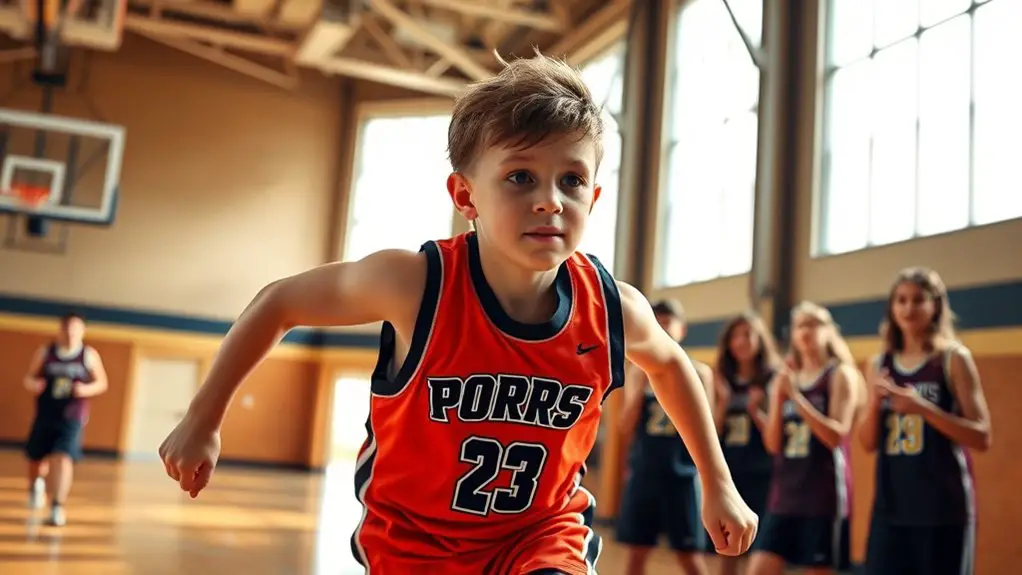Mental toughness separates legends from average players because it combines resilience, focus, and unwavering self-belief. It helps you push through obstacles, manage pressure, and stay committed to your goals. With mental toughness, you can maintain composure during critical moments and embrace discomfort as part of the journey. This mindset not only enhances your performance but also fosters personal growth. Discover more about how to cultivate this essential trait and thrive in your athletic journey.
Defining Mental Toughness in Sports
When you think about what sets elite athletes apart, mental toughness often comes to mind. It's more than just grit; it's about harnessing mental strength and psychological endurance to overcome challenges. This means staying focused under pressure, pushing through fatigue, and maintaining belief in your abilities, no matter the odds.
Mental toughness is the backbone of success in sports. You've got to cultivate a mindset that embraces discomfort and thrives in adversity. It's about pushing past your limits and refusing to let setbacks define you. When faced with obstacles, mentally tough athletes dig deep, drawing from their inner reserves to rise above.
To truly excel, you need to understand that mental toughness isn't a fixed trait; it's a skill you can develop. Embrace the journey, challenge yourself, and watch how your mental strength transforms your performance. Building resilience in sport comes from mastering both body and mind.
The Role of Resilience in Athletic Performance
While talent and training are essential, resilience often serves as the cornerstone of athletic performance. It's about how you bounce back when the going gets tough. Without emotional endurance, even the most skilled athletes can falter. Here are three resilience strategies to enhance your performance:
- Mindfulness Practices: Stay present during challenges. Focusing on the here and now can help you manage stress and maintain clarity.
- Goal Setting: Break down your objectives into smaller, achievable tasks. This keeps you motivated and allows for adjustments along the way.
- Positive Self-Talk: Replace negative thoughts with empowering affirmations. This shift helps build confidence and fortitude when faced with setbacks. Additionally, incorporating meditation practices can significantly enhance your mental toughness and overall performance.
Overcoming Adversity: Stories of Legendary Athletes
When you think about legendary athletes, their inspiring stories often highlight how they've overcome injuries and setbacks. These athletes showcase incredible mental resilience in competition, proving that grit can lead to remarkable comebacks. Let's explore some of these powerful narratives that define true sportsmanship. Embracing challenges as opportunities for learning and growth is a common thread among these athletes, allowing them to transform setbacks into stepping stones for success.
Defying Injuries and Setbacks
Resilience is a hallmark of legendary athletes, defining their journeys through injuries and setbacks. You can cultivate this resilience by implementing effective strategies during tough times. Here are three essential approaches:
- Injury Management: Prioritize your physical health with proper rehabilitation and a solid recovery mindset to combat performance anxiety.
- Setback Strategies: Develop coping mechanisms and motivational techniques to transform challenges into growth opportunities.
- Psychological Support: Engage in resilience training and seek psychological support to enhance mental recovery.
Mental Resilience in Competition
Overcoming injuries and setbacks is just one aspect of a player's journey; mental resilience in competition takes this to another level. You know that feeling when the pressure's on, and everything seems to be against you? That's where emotional endurance kicks in. Legends thrive in these moments, embracing the chaos and channeling it into their performance. It's not just about physical skill; it's about nurturing a competitive mindset that keeps you focused and driven, even when the odds are stacked high. You can learn from those who've faced immense challenges, turning adversity into fuel. In the heat of competition, it's mental toughness that separates the great from the good, proving that resilience can redefine your game and release your true potential.
Inspiring Comeback Stories
Though setbacks can feel insurmountable, many legendary athletes have turned their struggles into remarkable comebacks that inspire us all. Here are a few stories that showcase true comeback motivation:
- Michael Jordan: After being cut from his high school team, he channeled his disappointment into relentless practice, ultimately becoming one of the greatest basketball players ever.
- Serena Williams: After battling health issues and giving birth, she returned to win Grand Slam titles, proving that resilience can lead to unexpected victories.
- Drew Brees: After a devastating shoulder injury, he not only returned to play but also led his team to a Super Bowl win, embodying the spirit of perseverance.
These athletes remind us that overcoming adversity can redefine our paths and inspire others to rise.
Key Traits That Make Up a Mentally Tough Athlete
Mental toughness in athletes is often defined by a unique set of traits that set them apart from the competition. To thrive, you need focus factors that sharpen your concentration and discipline habits that keep you on track, even when motivation wanes. Confidence building is essential; it fuels your belief in your abilities. Emotional control allows you to manage stress and maintain composure under pressure, while goal setting creates a clear path toward success.
Incorporating realistic goals into your training can further enhance your self-confidence and propel you toward your aspirations. Self-belief is the cornerstone of mental toughness, empowering you to push past limits. Visualization techniques help you mentally rehearse performances, reinforcing a competitive mindset that drives you to excel. By cultivating these traits, you'll not only elevate your game but also embrace the freedom that comes with being a mentally tough athlete. Adopting this mindset can transform your performance and set you on a path to greatness.
The Impact of Pressure on Performance
Pressure is an inevitable part of competitive sports, and how you respond to it can greatly affect your performance. In pressure situations, you might experience performance anxiety, but mastering your emotions can give you that competitive edge. Here are three key focus techniques to enhance your mental preparation:
- Stress Management: Develop routines to manage stress before game time, such as breathing exercises or visualization.
- Emotional Control: Learn to recognize your feelings and channel them positively, rather than allowing them to overwhelm you.
- Game Time Mindset: Cultivate a mindset that embraces pressure as an opportunity to shine rather than a threat. Embracing vulnerability allows for authentic self-expression, which can further enhance your performance under pressure.
Mental Toughness Training Techniques
Building resilience is essential for athletes looking to enhance their performance under pressure. To achieve this, you can implement a variety of mental toughness training techniques. Start with visualization techniques; picture yourself succeeding in high-pressure situations. Combine this with mindfulness practices to stay present and grounded, reducing stress during competition.
Goal setting plays an important role too; break down your ambitions into manageable milestones. Use positive affirmations to reinforce your belief in your abilities. Incorporate stress management strategies, such as deep breathing, to maintain calmness. Focus training helps sharpen your concentration, ensuring distractions don't derail your performance.
Lastly, adopt self-discipline strategies to stay committed to your training regimen, and explore motivation methods that resonate with you. By integrating these techniques into your routine, you'll cultivate the mental toughness needed to rise above challenges and reach your full potential. Additionally, embracing discomfort as a part of the journey will help you develop resilience and thrive in future competitions.
The Connection Between Mental Toughness and Success
While many factors contribute to an athlete's success, mental toughness often stands out as a key differentiator. It fuels your drive and sets you apart from the crowd. When you cultivate this resilience, you reveal your potential through effective motivation strategies and focus techniques.
Here are three ways mental toughness connects to success:
- Enhanced Resilience: You bounce back from setbacks, learning and growing stronger each time.
- Improved Focus: By honing your focus techniques, you stay present and eliminate distractions during critical moments.
- Increased Determination: Your commitment to pushing through challenges keeps your goals in sight, no matter the obstacles. Additionally, mindfulness meditation can significantly enhance your ability to maintain focus and reduce anxiety, leading to better performance outcomes.
Incorporating these elements into your training can elevate your performance. By fostering mental toughness, you're not just aiming for success; you're redefining it. Embrace the journey and let your mental strength lead the way.
How Coaches Can Foster Mental Toughness in Athletes
Coaches play a pivotal role in shaping an athlete's mental toughness, as their guidance can transform challenges into opportunities for growth. By employing effective coaching strategies, you can enhance team dynamics and foster a competitive mindset. Start with open communication; it builds trust and allows athletes to share their struggles. Use emotional intelligence to understand their feelings and motivations, tailoring your approach accordingly.
Incorporate goal setting to provide clear targets, while encouraging feedback loops that help athletes reflect on their performance. This promotes resilience and adaptability, essential traits for mental toughness. Celebrate small victories to boost athlete motivation and reinforce their belief in overcoming obstacles. Additionally, implementing breathing exercises can help athletes manage anxiety and maintain focus during high-pressure situations. Ultimately, your ability to nurture these elements will empower athletes to embrace challenges, improving not just their performance but their psychological resilience, too. By fostering a supportive environment, you'll cultivate legends who thrive under pressure.
Lessons From Legends: Applying Mental Toughness in Everyday Life
The principles of mental toughness that athletes develop through coaching can be applied beyond sports, offering valuable lessons for everyday life. You can cultivate a positive mindset and resilience through simple yet powerful practices. Here are three key strategies to incorporate:
Mental toughness learned in sports can enhance everyday life, fostering resilience and a positive mindset through simple practices.
- Mindful Practices: Engage in mindfulness to enhance emotional regulation and reduce stress. Just a few minutes of focused breathing can bring mental clarity.
- Daily Affirmations: Start your day with affirmations that reinforce your goals. This boosts motivation and sets a positive tone for challenges ahead.
- Gratitude Journaling: Reflect on what you're thankful for. This practice fosters a positive perspective and enhances emotional well-being. Additionally, incorporating visualization techniques into your routine can further enhance your mental preparation and performance in various aspects of life.
Frequently Asked Questions
Can Mental Toughness Be Developed at Any Age?
Absolutely, mental toughness can be developed at any age! It's all about building mental resilience and being open to growth. You can embrace challenges, learn from failures, and adapt your mindset, no matter how old you are. Age adaptability plays a key role here; it allows you to harness experiences and transform them into strength. So, don't let age hold you back—start cultivating your mental toughness today and enjoy the freedom that comes with it!
How Can Parents Support Their Child's Mental Toughness?
Think of a tree bending in the wind; it doesn't break, it adapts. You can support your child's mental toughness by using encouragement strategies that foster resilience building. Celebrate their efforts, not just results, and help them face challenges head-on. Create a safe space for them to express emotions, and teach them to embrace failures as stepping stones. With your guidance, they'll learn to stand tall, just like that resilient tree.
What Role Does Nutrition Play in Mental Toughness?
Nutrition plays a vital role in building mental toughness. By adopting effective nutrition strategies, you can boost your brain health, enhance focus, and improve resilience. Think of foods rich in omega-3 fatty acids, antioxidants, and complex carbs; these fuel your brain and stabilize your mood. When you nourish your body with the right nutrients, you're setting yourself up for success, helping you bounce back from challenges with confidence and clarity.
Are There Specific Sports Where Mental Toughness Is More Critical?
Absolutely, some sports demand mental toughness more than others. In rugby, resilience is essential; the physicality and intensity require you to push through pain and setbacks. On the other hand, tennis is all about pressure; you've got to maintain focus during high-stakes moments. In both cases, your mental strength can make or break your performance. If you harness that toughness, you'll find yourself elevating your game and embracing the freedom of competition.
How Do Cultural Differences Impact Perceptions of Mental Toughness?
Cultural perspectives shape how you view mental resilience. In some cultures, it's seen as a sign of strength to push through adversity, while others may value collaboration and seeking support. This can affect how you approach challenges and recover from setbacks. Recognizing these differences can help you adapt your mindset and strategies, empowering you to harness your potential and thrive, regardless of the cultural lens through which you're viewing mental toughness.




